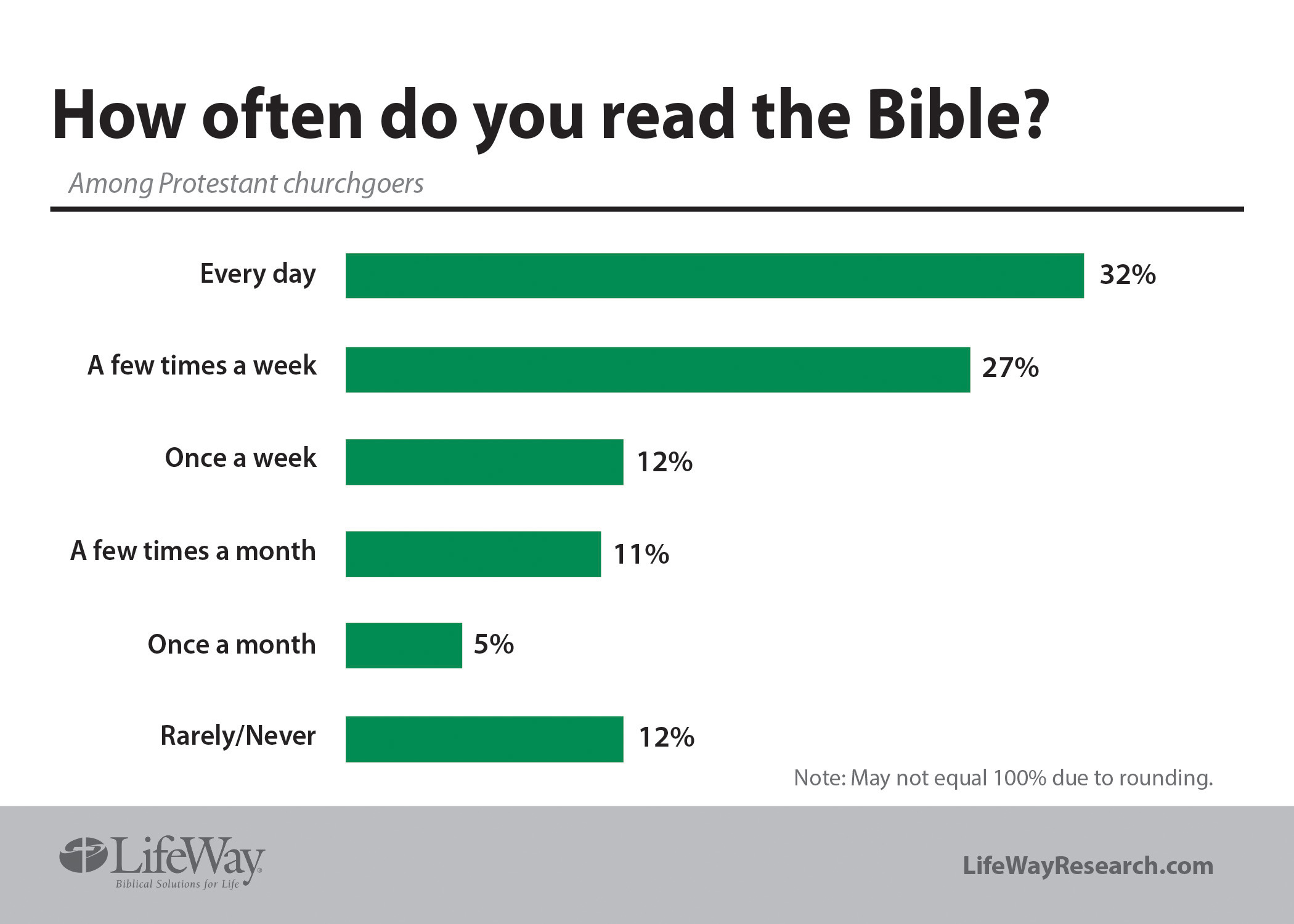
NASHVILLE (BP) — Christians say the Bible is God’s Word, but even among Protestant churchgoers only a third spend time reading it every day, according to a study released Tuesday (July 2).
 The 2019 Discipleship Pathway Assessment study from LifeWay Research, conducted Jan. 14–29, found those who regularly attend Protestant churches are inconsistent in their reading and thinking about Scripture.
The 2019 Discipleship Pathway Assessment study from LifeWay Research, conducted Jan. 14–29, found those who regularly attend Protestant churches are inconsistent in their reading and thinking about Scripture.
The study identifies Bible engagement as one of eight signposts that consistently show up in the lives of growing Christians.
“This research asked churchgoers about many biblical characteristics to see which actions, beliefs and desires are present in the lives of followers of Christ,” said Scott McConnell, executive director of LifeWay Research. “Among them, Bible reading was one of the most predictive of spiritual maturity.”
Regular Bible reading
A third of Americans who attend a Protestant church regularly (32 percent) say they read the Bible personally every day. Around a quarter (27 percent) say they read it a few times a week.
Fewer say they only read it once a week (12 percent), a few times a month (11 percent) or once a month (5 percent). Close to 1 in 8 (12 percent) admit they rarely or never read the Bible.
A 2016 LifeWay Research study found 1 in 5 Americans said they had read all of the Bible at least once. However, more than half said they have read little or none of it.
In the latest study, churchgoers aged 50 to 64 are more likely to say they read the Bible every day (35 percent) than adults under 50 (30 percent).
Churchgoers in the western U.S. (37 percent) are more likely to be everyday Bible readers than those in the Midwest (31 percent) or South (31 percent).
Hispanics are the ethnic group most likely to say they read Scripture every day (40 percent).
 Those who attend church four times a month or more (34 percent) are more likely to read every day than those who attend less frequently (27 percent).
Those who attend church four times a month or more (34 percent) are more likely to read every day than those who attend less frequently (27 percent).
Evangelical Protestants (36 percent) and black Protestants (30 percent) are also more likely than mainline Protestants (20 percent) to say they read Scripture every day.
“Jesus’ prayer for His followers was that they would be sanctified by the truth of God’s Word,” McConnell said. “It’s not surprising that the lives of those who spend time reading the Bible look more like Christ.”
Impact of regular Bible reading
In a 2016 study of churchgoing Protestant parents, LifeWay Research found regular Bible reading as a child was the biggest factor in predicting the spiritual health of young adults.
The latest survey finds Bible reading as an adult has similar far-reaching effects.
LifeWay Research asked churchgoers if they think about biblical truths throughout the day and if they miss time with God if they go several days without reading the Bible. Responses to those questions are closely tied to how regularly churchgoers read the Bible.
When asked if they find themselves thinking about biblical truths throughout the day, 32 percent of Protestant churchgoers strongly agree. In total, nearly 7 in 10 at least somewhat agree (69 percent).
Twelve percent disagree and 20 percent aren’t sure.
Women (33 percent) are more likely than men (29 percent) to strongly agree.
Churchgoers 65 and older (27 percent) are the age demographic least likely to strongly agree, while Hispanics (52 percent) are the ethnic group most likely to strongly agree.
Evangelical Protestants (35 percent) and black Protestants (33 percent) are more likely than mainline Protestants (18 percent) to strongly agree.
Among those Protestant churchgoers who say they read the Bible every day, 51 percent say they find themselves thinking about biblical truths during the day.
For those who read the Bible a few times a week, 32 percent say the same. That falls to 20 percent of those who read Scripture once a week to a few times a month and 9 percent of those who read it once a month or less.
“This is a case in which the action of reading the Bible influences one’s thoughts,” McConnell said. “This mindfulness on God’s truths has additional benefits of influencing other actions and speech.”
A third of Protestant churchgoers (33 percent) strongly agree they desperately miss the time with God if they go several days without reading the Bible. Nearly 3 in 5 at least somewhat agree (58 percent).
Around 1 in 5 disagree (20 percent) and 22 percent neither agree nor disagree.
Women (36 percent) are more likely to strongly agree than men (30 percent). Hispanic churchgoers (44 percent) are more likely to strongly agree than African American (36 percent) and white churchgoers (31 percent).
Those 65 and older are the least likely age group to strongly agree they miss the time with God when they go several days without reading the Bible (27 percent).
Evangelical Protestants (38 percent) and black Protestants (33 percent) are more likely to strongly agree than mainline Protestants (19 percent).
The more regular the Bible reading habit, the more likely churchgoers are to say they miss that time with God.
Among Protestant churchgoers who read the Bible every day, 65 percent strongly agree. That number is cut in half among those who read Scripture a few times a week (32 percent). It continues to decline among those who read it once a week or a few times a month (13 percent) and among those who read it once a month or less (6 percent).
“One indication that reading God’s Word is beneficial is how much readers miss it after not reading for a few days,” McConnell said. “This fits with the Bible’s own description of itself as being ‘living and effective.'”
Bible engagement is one of eight signposts measured in the Discipleship Pathway Assessment and addressed in LifeWay’s Bible Studies for Life curriculum. For more information, visit DiscipleshipPathwayAssessment.com.
Methodology
The online survey of 2,500 Protestant churchgoers was conducted Jan. 14–29, 2019. Respondents were screened to include those who identified as Protestant or non-denominational and attend religious services at least once a month. Quotas and slight weights were used to balance gender, age, region, ethnicity, income and denominational affiliation. The completed sample is 2,500 surveys. The sample provides 95 percent confidence that the sampling error does not exceed plus or minus 2.0 percent. Margins of error are higher in subgroups.
LifeWay Research is a Nashville-based evangelical research firm that specializes in surveys about faith in culture and matters that affect churches.













